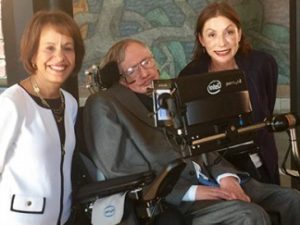Young Reflects on Stephen Hawking’s Influence, Carolina’s Connections
March 14, 2018UNC Global Affairs

UNC-Chapel Hill Chancellor Carol L. Folt, renowned physicist Stephen Hawking and theoretical physics associate professor Laura Mersini-Houghton.
In August 2015, I had a stage manager’s dream role, pulling back a curtain and cuing Stephen Hawking to take the stage. We were at the Waterfront Congress Center in Stockholm, Sweden, where he was to deliver a public lecture, “Quantum Black Holes,” to an audience of more than 3,000 people after being introduced by UNC-Chapel Hill Chancellor Carol Folt.
Like Professor Hawking, I was in Stockholm for an academic gathering co-sponsored by Carolina, along with the Nordic Institute of Theoretical Physics (Nordita), an institute co-hosted by KTH Royal Institute of Technology and Stockholm University; the Centre for Theoretical Cosmology at the Department of Applied Mathematics and Theoretical Physics at the University of Cambridge; and The Julian Schwinger Foundation. The conference was organized through the efforts of Professor Laura Mersini-Houghton, cosmologist and theoretical physicist in the UNC College of Arts and Sciences, and her some of her close scientist colleagues.
We were together in Stockholm for a week for the Hawking Radiation Conference, where scientists were grappling with what most of us consider to be inexplicable rules of the universe, a science well outside the boundaries of my experience and knowledge. I had come to be a part of it all through my role as Director of Global Relations for UNC Global, an external relations role with roots in my work as a writer. How a career in writing extended to external relations is a separate matter, but what is important to me about it is the influence that Professor Hawking had on who I am as a writer. Truly, at the core of my love for language, I think of myself as a poet, and in Professor Hawking’s words and being I saw endless metaphors, symbolism and a light I typically associate with literary greatness.

At dinner one evening toward the beginning of the conference, Professor Hawking sat at the center of a long table filled with some of the world’s greatest physicists and senior university leaders, overlooking the shimmering lights of Stockholm Palace reflected in the Lilla Värtan bay. Conversation drifted from the upcoming U.S. elections to the Syrian refugee crisis to physics theories, like an idea that nothing is ever really gone—just changed in matter and makeup. In the shadow of our conversations was the reality of the world coming to the conference with us: the pressing news cycle and soon its reminder of a truck driver who transported 71 migrants from Syria only to abandon them in his truck alongside a highway in Austria. They all perished.
The topic of the humanitarian crisis stemming from the Syrian civil war was among many important issues that Professor Hawking wrote about. “We must use our human intelligence to end this war,” he challenged us in a piece for The Guardian in 2014.
Professor Hawking, like other scientists in our midst that evening, was at the physics meeting to examine the scientific laws of our universe; what he gave us as a people was his important voice for our generation, and a challenge to use our minds and talents more wisely, to be better stewards of our global community and world. In addition to writing on the Syrian refugee crisis, he was steadfast in his writings about national health care’s role in prolonging his life, our human attitudes about wealth, and what he referred to as the endless resourcefulness, optimism and adaptability of humans.
As we went around that dinner table to offer introductions to one another, at last we stopped at Professor Hawking, who used the time the rest of us spent talking about ourselves to cue up his computer and voice synthesizer for his simple statement: “I am Stephen Hawking,” he said. “And I just want to know how the universe works.”
In these few words, I saw his multiple intentions in seeking answers for “how the universe works,” an idea he also articulated in The Guardian. “The universal principle of justice may not be rooted in physics,” he wrote, “but it is no less fundamental to our existence.”
Professor Hawking inspired millions not just because of his science, or because he lived fully and against the odds, but because he embraced his role as a great moral conscience for humanity.
Katie Bowler Young is director of global relations for UNC Global. She is also the author of State Street (Bull City Press, 2009) and Enrique Alférez: His Life and Art (forthcoming, The Historic New Orleans Collection).
